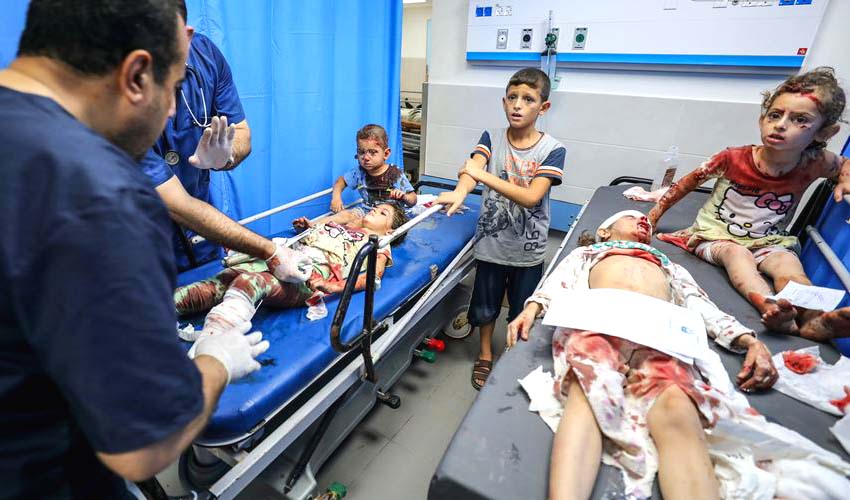In the northern Gaza Strip, a humanitarian crisis of alarming proportions is unfolding as infants grapple with the life-threatening consequences of drought and malnutrition.
The Palestinian Ministry of Health has sounded the alarm, reporting that ‘a number of infants suffering from serious conditions have been admitted to Kamal Adwan Hospital.’
This crisis does not exist in isolation; it is a direct result of the ‘severe and suffocating isolation imposed by the Israeli occupation army on the Gaza Strip,’ according to the Ministry’s statement, which further highlights the dire situation facing nearly 700,000 Palestinians cut off from the necessities of life.
Husam Abu Safiya, the director of Kamal Adwan Hospital, provided a grim insight into the situation, stating: ‘We have seen a number of children in the northern area of the Strip die due to malnutrition and food shortages, as well as the spread of diseases resulting from the continuous Israeli aggression and blockade.’ This blockade has led to a severe scarcity of food and clean water, pushing some to the brink of despair. Abu Safiya warned of the critical conditions newborns are arriving in, showing ‘signs of weakness and pallor due to maternal malnutrition.’
Preliminary data from the UN indicates that ‘one out of every ten children under the age of five in Gaza suffers from severe malnutrition’, a staggering statistic. Moreover, the charitable organisation Action Aid has highlighted the extent of the desperation, noting that ‘some people resort to eating grass,’ and emphasising the acute hunger afflicting the entire population of Gaza.
Amid these dire circumstances, the UN has accused Israeli forces of ‘systematically’ blocking access to people in need in Gaza, exacerbating an already dire humanitarian situation. Jens Laerke, the spokesperson for the UN Office for the Coordination of Humanitarian Affairs (OCHA), conveyed the difficulties faced by aid organisations, stating: ‘It has become nearly impossible to carry out medical evacuations and aid deliveries in northern Gaza and increasingly difficult in the south.’
He detailed instances where aid convoys, even those cleared in advance with Israeli authorities, have been blocked or come under fire.
Laerke shared a particularly distressing incident involving a medical convoy from the WHO and the Palestinian Red Crescent, intended to evacuate patients from Al Amal hospital in Khan Younis, which was detained for hours, and paramedics were detained. ‘Despite prior coordination for all staff members and vehicles with the Israeli side, the Israeli forces blocked the WHO-led convoy,’ Laerke said.
This obstruction has had fatal consequences, with the WHO affirming that ‘40 Israeli attacks on Al Amal Hospital from January 22 to February 22 killed at least 25 people and left the facility incapacitated.’
The targeting of healthcare facilities and workers is a stark indicator of Israeli lawlessness pervading the war zone that Gaza has become.
In response to these overwhelming challenges, the ‘Youth for Gaza’ initiative has called for a comprehensive general strike across several Arab capitals on Thursday, February 29, seeking to draw international attention to the crisis. The initiative declared, ‘Gaza is being starved, so let’s put pressure on our governments to stop the war and break the siege.’
MPs £31m for bodyguards
TORY Home Secretary James Cleverly has announced that MPs will get an extra £31m ‘security package’, including bodyguards.
The funding will also be used for additional police patrols in response to increases ‘community tensions’, he said.
Last week, House of Commons Speaker Sir Lindsay Hoyle claimed that his prevention of the SNP motion calling for an immediate Ceasefire in the Israeli war against Palestine from being heard in Parliament was because of ‘threats to politicians’.
The Home Office said the funding package would be used to ‘increase private sector security provisions’ for locally elected representatives.
It said the money would also ensure all elected representatives and candidates have a dedicated named police contact to liaise with on security matters.
Meanwhile, a new ‘communities fund’ will be established to allow extra police patrols in England and Wales, with forces able to use the fund to increase police presence in response to specific events.
Yesterday Cleverly held talks with police chiefs to discuss ‘how to better ensure the safety of MPs’.
‘The government will take every possible step to safeguard the people, processes and institutions upon which our democracy relies,’ he said.
‘I take the safety and security of all members of the House with the utmost seriousness. None of us should have to accept that enduring hate crimes, harassment, or threats is part of the job.’
Security Minister Tom Tugendhat said: ‘Over the past few weeks we’ve seen disgraceful attempts to intimidate MPs and undermine our democratic processes. That behaviour is a threat to our democracy, and toxic for our society.’
Preet Gill, Labour MP For Birmingham Edgbaston, claimed death threats have become ‘a norm’ in her job, while Conservative Stafford MP Theo Clarke said she carried a panic button directly linked to the police ‘at all times’.
House of Commons Speaker Hoyle said the money will provide ‘much-needed reassurance’.
‘It will enable us to build on the improvements we have made over the past two years, working with the police and Home Office to enhance security at MPs’ homes and offices, and crucially when they are out and about meeting their constituents.’
Former Tory Cabinet minister Sir Robert Buckland welcomed the funding, saying: ‘If we start sequestering politicians away from the public, I’m worried that that Westminster bubble, the ivory tower syndrome, will only get worse and divorce politicians from the people they represent… that’s why safety is a very important consideration.’
